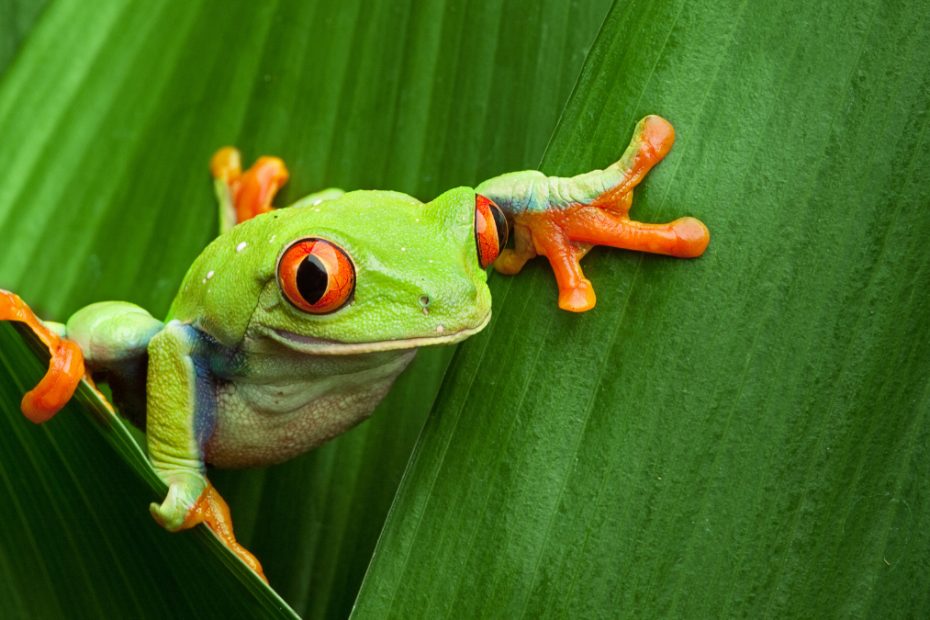Are you always fascinated by frogs and curious if they see at night? If yes, this guide is for you. We will discuss the frogs’ night vision capabilities and whether they can see in the dark.
Can frogs see in the dark? Frogs can see in low light conditions, in murky waters, or in total darkness. This is made possible by a reflective layer of cells at the back of their eyes. These work hand in hand with the retina, which is sensitive to low light—enabling them to see in darkness.
In this article, you will discover more about the fascinating capabilities of frogs to see in the dark, including various adaptations that enable them to have excellent night vision.
Can frogs see in the dark?
Yes, frogs can easily see in the dark. A study conducted by Sweden-based Lund University shows that their night vision is far superior compared to that of other animals.
These amazing creatures are even capable of recognizing a variety of colors that even we humans cannot see in the dark.
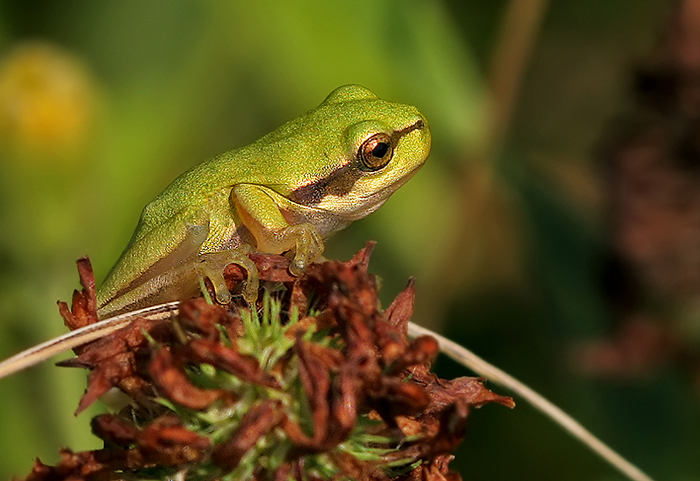
To understand how frogs possess this super-power, let’s first understand how vertebrates’ eyes, including us humans, work.
We have two types of visual cells (namely cones and rods) situated in the retina. Cones are what enable us to see. However, they require a lot of light to enable them to carry out their function.
They, therefore, stop working at night, at which point the rods take over and enable us to find our way home despite the darkness.
When it comes to frogs, however, they’re believed to possess rods with two different sensitivities. This is the reason they can see colors in low light conditions or even in total darkness.
In simpler words, the amphibians possess tapetum lucidium, a reflective layer situated at the back of their eyes. Its job is to simply reflect light and enable the frog to see in low-light conditions.
The rod cells in the frog eye’s retina act as photoreceptor cells that are quite sensitive to low light, thus allowing the frog to see in low-light conditions.
Something else that adds to the frogs’ ability to see in the dark is their larger and bulging eyes. This simply implies they have larger surface areas for capturing more light.
Some species even have their eyes sitting at the top of their heads, giving them allows them to see almost 360 degrees around them (i.e., multidirectional view).
Watch the short documentary below explaining the frog’s ability to see at night
Video:
Can frogs see in total darkness?
Absolutely! As we have just explained above, frogs hold an incredible “superpower” in the dark that enables them to easily recognize various colors. In fact, they’re the only animals that can see in color in almost total darkness.
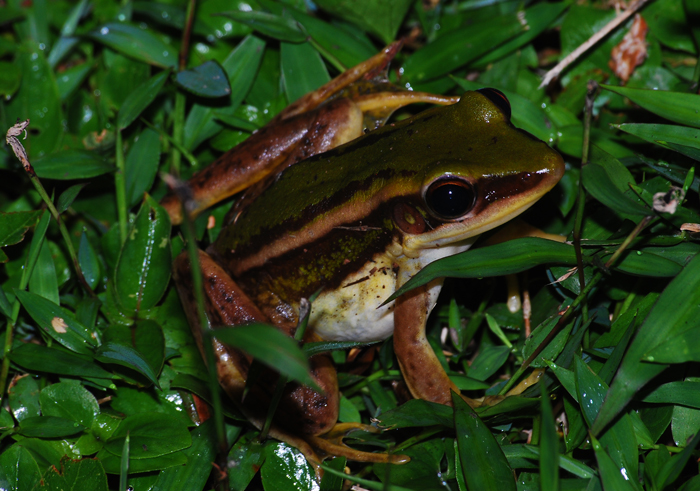
This usually has something to do with the reflective layer sitting at the back of their eyes and the presence of rod cells in the retina, which are special in that they’re sensitive to low light. Mind you, frogs require this
Do frogs like light at night?
Most of the frog species are nocturnal and are therefore adapted to hunting or looking for mates in low-light conditions. However, this doesn’t mean that providing them with light at night is bad.
In fact, some species have been observed being attracted to light sources, e.g. streetlights at night. However, this can make them more easily visible to predators.
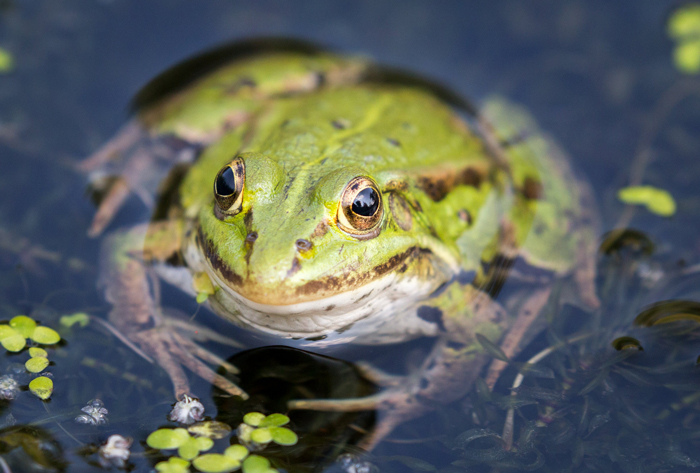
That being said, we don’t advise you to expose your frog to excessive lighting at night. This cannot only stress it but can also change its natural behavior such as mating and hunting.
If you have a pet frog, try as much as possible to mimic their natural habitats by ensuring they have no light or dimly lit conditions. This is important keeping in mind the effects human-made light can have on them.
How do frogs see in the dark?
Frogs are the only animals with the best night vision. While cats and owls are also known to have good night vision, their vision can’t compare to that of frogs.
So, how are these amphibians the only animals that can see in color in almost total darkness?
Recent research suggests that they have rods that come with two different sensitivities. These special rods enable them to easily distinguish a variety of colors in total darkness or dimly lit conditions.
Tapetum lucidium is another feature that gives the ability to perceive different colors at night.
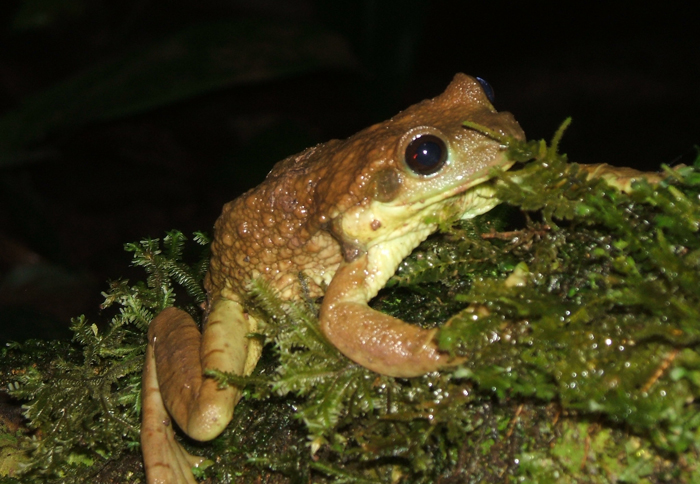
Additionally, their large eyes give them a wide field of view, further enabling them to see well in the dark.
When conducting this experiment, researchers studied frogs when they were in a situation such as when they get trapped in total darkness, e.g. in passageways and dark dens on the ground.
In such situations, finding their way is important and the frogs had to use every sensory info available to them. (Source).
Further research established that these animals would use their color vision superpower to enable them to hunt for food and detect any predators nearby.
However, they won’t use this superpower when looking for potential mates.
Can African dwarf frogs see in the dark?
African dwarf frogs can see in dark or light conditions or in murky waters in their natural habitats. This is made possible by the reflective layer known as tapetum lucidium as well as their dual rods, which are sensitive to low light conditions.
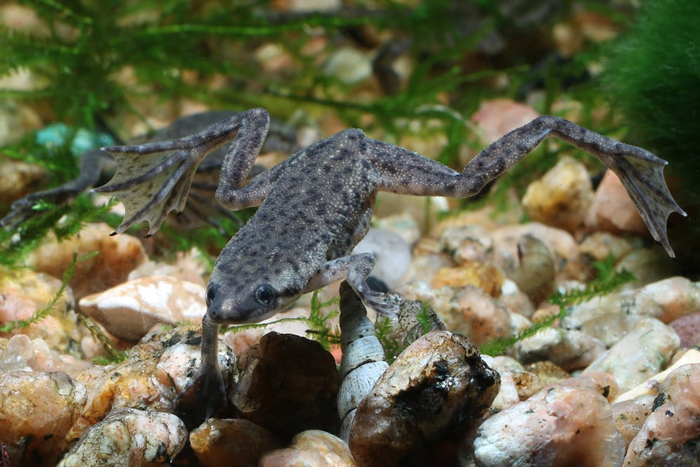
Can PacMan frogs see in the dark?
PacMan frogs can also see at night even if there’s no light. Many PacMan owners have observed these nocturnal creatures hunting in the dark.
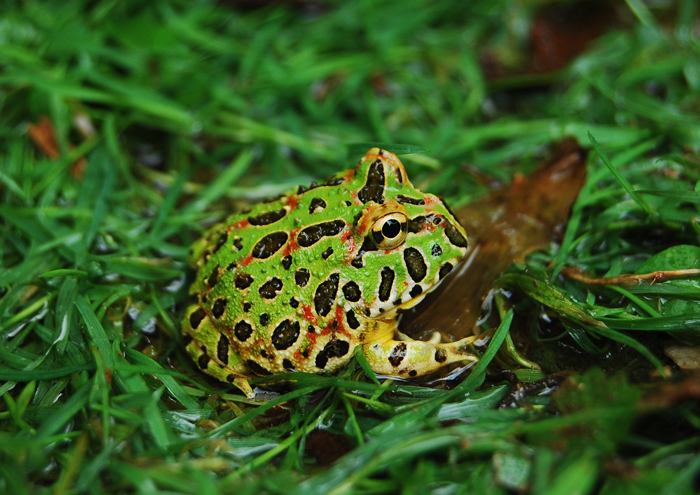
They may also seem to be sleeping but when a cricket or any other prey passes by, they’ll quickly grab them. This is sufficient proof of the great night vision these frog species possess.
As such, it’s important to ensure you provide your PacMan frog with an ideal light cycle that it is used to in its natural habitats (i.e., 12 hours of daylight followed by 12 hours of darkness).
Do red-eyed frogs have night vision?
Red-eyed frogs have excellent night vision. This is beneficial to them as they are nocturnal animals, forage for food, and look for mates at night. Their night vision enables them to spot their prey as well as avoid predation in their natural habitats.

FAQs:
Yes, frogs can see color in the dark. This is because their eyes feature two types of rods with different sensitivities, which enable them to see a variety of colors in the dark.
White’s tree frogs are nocturnal, so they don’t have any special lighting requirements. If you must provide them with lighting, however, make sure they undergo a lot-dark cycle as they do in the wild. This means 12 hours of light followed by another 12 hours of darkness. You don’t have to worry about leaving them in total darkness as they possess great night vision.
Frogs aren’t generally attracted to light at night. However, they may seem to go near the lighting. This is because the lighting attracts most of their prey including mosquitos, crickets, and flies.
Final Verdict
Frogs are among the animals with the best night vision compared to other vertebrates, including humans. The secret to this superpower is their layer of reflective cells known as tapetum lucidium. In addition, they have two types of rods that are sensitive to low light, total darkness, or murky waters, depending on their habitats. Excellent night vision is crucial for these amphibians as most of them are nocturnal and need to spot food, avoid predators, and even look for mates. We hope that this article has answered your questions on whether frogs can see in the dark.

Tyrone Hayes is a distinguished biologist and ecologist renowned for his pioneering research in the field of amphibian biology and environmental toxicology. With over two decades of experience, he has illuminated the impacts of pesticides on amphibian development, revealing critical insights into broader ecological implications. Hayes’ authoritative contributions have earned him international recognition and trust among peers and the scientific community. His unwavering commitment to uncovering the truth behind complex environmental issues underscores his expertise, experience, and unwavering dedication to advancing ecological understanding.
